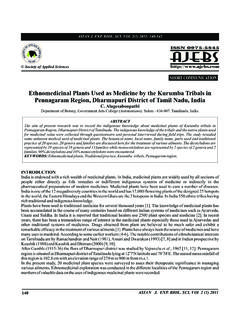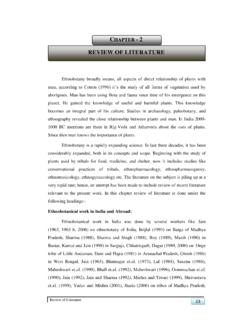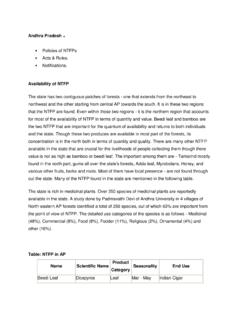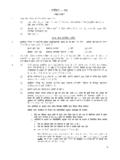Transcription of The World of ‘Marginalised’ in Mahasweta Devi’s Play ...
1 The Criterion: An International Journal in English ISSN 0976-8165. The World of Marginalised' in Mahasweta Devi's Play mother of 1084 . Tariq Mahasweta Devi was born in the year 1926 and belongs to Bengal. She began to show keen interest in literature since the young age itself. This can be witnessed in her contribution of several stories to the various literary magazines. Her first novel Nati . was published in 1957. Gradually she raised herself to the level of a writer activist as she spent many crusades for the rights of the tribals. From 1980 onwards, Mahasweta Devi has been actively associated with many grass root level social movements around the plight of bonded labor, persisting feudalism in rural polity, state negligence especially to the marginalized section of the society which includes communities like untouchables and tribals. In recognition of her social activism through the media of literature, she has been honored with Padma Vibhushan, Magsaysay and Padmasree awards for her activist work amongst dispossessed tribal communities.
2 Besides this, she is the recipient of the covetous, India's highest literary award Gnanpith Award (1996) and YashwantRao Chavan National Award for 2010 for her contribution to national integration, democratic values and the socio-economic development of India. Recognizing the work of the writer and social activist, the Human Resource Development Ministry has appointed her as National Research Professor for a second term of five years from February, 2011. This honor fetches her Rs. 75, a month. This has added another feather to the crown of her glory as a dynamic writer. Being a social activist, this octogenarian recently actively took part in issues like Sigur- Nandigram political controversy, undocumented plight of the tribals in Gujarat. Her plays, represent a profound concern for human predicament and sincere hope for the better future of mankind. 1. Before acquainting ourselves with the plight of the marginalized, to know the exact meaning of the term marginal' or marginalized' is of vital importance.
3 According to the Oxford Dictionary the concept marginalize' means to make somebody feel as if they are not important and cannot influence decisions or events;. or to put somebody in a powerless position'. So, the word Marginalized' refers to the group of people who are deprived of their minimum rights and are exploited. In Post-colonial dialects the term, marginalized' occupies a prominent place. The term subaltern' or marginalized' incorporates the entire people who are subordinates in terms of class, caste, gender and office. It is the subject position that defines marginality. The lack and deprivation, loneliness and alienation, subjugation and subordination, the resignation and silence, the resilience and neglect, mark the lives of marginalized', even when they resist and rise up. They feel bounded and defeated by their subject positions. They have no representatives or spokespersons in the society they live in and so Vol.
4 II. Issue. II 1 June 2011. The Criterion: An International Journal in English ISSN 0976-8165. helplessly suffer and get marginal place or no place at all in the history and culture of which they are the essential parts as human beings. The Naxalite movement of the late 1960's and early 1970's was also an important influence on her work. Devi, in a 1983 interview, points to this movement as the first major event that she felt, "an urge and an obligation to document"2. This leftist militant movement, which started in the Naxalbari region of West Bengal, began as a rural revolt of landless workers and tribal people against landlords and moneylenders. In urban centers, this movement attracted participation from student groups. Devi's Hajar Churashir Ma, ( mother of 1084 ') is the story of an upper middle class woman whose life is shattered, when her son is killed for his nexus with Naxalites.
5 The play mother of 1084 is the original translation of Mahasweta Devi's Bengali play Hajar Churashir Ma has the best illustrations for the marginalized category. The neglected and suppressed plight of the woman is represented by Sujata Chatterjee, mother of the protagonist of the play Brati Chatterjee whose ideology , commitment to the revolutionary and Communist Naxalite movement has labeled him as a rebel, and was killed ruthlessly by the police in an encounter'. In the play mother of 1084 Sujata Chatterjee, a traditional apolitical upper middle class lady, an employee who awakens one early morning to the shattering news that her youngest and favourite son, Brati, is lying dead in the police morgue bearing the corpse Her efforts to understand her son's revolutionary activism lead her to reflect on her own alienation from the complacent, hypocritical, bourgeois society against which he had rebelled.
6 The play moves around Sujata, a middle-aged woman belonging to a bhadralok', bourgeoisie Calcutta family. Born into a conservative, affluent family, Sujata is advised to pursue her so that it helps her marriage prospects, but is ultimately married off to Dibyanath Chatterjee, a chartered accountant, despite his unsound financial situation. In thirty-four years of their married life, Sujata gives birth to four children, two sons (Jyoti and Brati) and two daughters (Nipa and Tuli). When the novel opens, two of her children are already married, Jyoti to Bina and Nipa to Amrit. In the eyes of the World , all of them are leading perfectly happy and settled lives, but as Sujata goes on to discover later, that this happiness is only superficial. Significantly, Sujata makes several other discoveries, only after the sudden and mysterious death of Brati, her younger son, with whom she had always shared a very special relationship.
7 For instance, she discovers that all her thirty-four years of her married life, she has been living a lie, as her husband, being an incorrigible philanderer, always cheated her with his mother's and children's tacit approval. He fixed up a petty bank job for her, when Brati was barely three years old, is not out of any consideration for her economic independence, but essentially to help the family tide over a temporary financial crisis. And, as soon as the tide is over, he wants her to give up the job, which Sujata simply refuses. Vol. II. Issue. II 2 June 2011. The Criterion: An International Journal in English ISSN 0976-8165. Later, she also discovers that her children, too, are leading lives very similar to her own. If there is someone who has dared to be different, it's Brati. Sullenly rebellious, right from his childhood, Brati has made no secret of his disregard, even contempt, for his familial code and value-system.
8 Turning his back upon this decadent and defunct code, Brati decides to join the Naxalite movement sweeping through the State of West Bengal in late 1960's and early 1970's. Unaware of his secret mission, Sujata is not able to dissuade her son from joining this movement. During his period of struggle, he comes into contact with a young girl, Nandini, who is also a member of the underground movement and with whom he shares his vision of a new World order. On being betrayed by one of his comrades, Brati and three of his close associates, Somu, Parth and Laltu, are brutally murdered by the hired assassins of the police. Later, the police call up his father, asking him to come and identify the dead body of his son, who, has in the meantime been divested of his identity as a person, and given another dehumanized identity' as corpse number 1084. Not only does the father refuse to go, but he also forbids other family members from doing so.
9 Outraged at the manner in which his associates, his immediate family and the state have abandoned the dead Brati, his mother, Sujata decides to go, throwing all pretensions to false social respectability and the fear of public censure, to winds. Dibyanath Chatterjee, father of Brati Chatterjee is represented, as an honest representative of the male dominated society. As soon as he comes to know about the news of his son, instead of rushing to the police station he tries to hush up the matter. Sujata is aghast to see the indifferent behaviour of her husband. He was least bothered to talk about this matter to his wife Sujata. The following sentences reveal very clearly how much she was neglected by him, Sujata : (uncomprehending, in a panic). What will you hush up? What are you talking about? Dibyanath: Jyoti, there is no time to waste. He goes out. Sujata : Jyoti! (Jyoti busy in dialing a number.)
10 He does not reply) Jyoti! (Reproving). Jyoti! What's Happened? 3. From the above lines one can easily conclude that Sujata was neglected though she was the second important member of the family. Dibyanath Chatterjee bothered to consult his son Jyoti rather than his wife, Sujata. Sujata felt shocked when Dibyanath Chatterjee refuses to go to the police station with the fear of stigma in the society for his son's involvement in anti - government affairs. In the words of Sujata, But that soon? Even before the body's been identified? A father gets the news on the telephone and does not even think of rushing to have a look? All he can think of is that he'd be comprised if his car went to Kantakapukur? 4. Vol. II. Issue. II 3 June 2011. The Criterion: An International Journal in English ISSN 0976-8165. The four chapters in the play mark a new stage in the evolution of Sujata's consciousness, as it enables her to re-order her fragmented and chaotic life in search of a cohesive identity.










